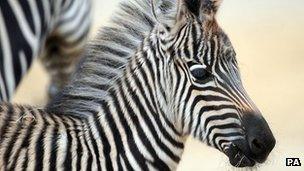Circus animal ban goes too far, say MPs
- Published
- comments

Zebras are among the 21 animals working in travelling circuses in England
The government's plan for a total ban on animals in travelling circuses in England "goes too far", MPs have said.
The Environment, Food and Rural Affairs Committee suggested creatures such as camels, zebras and snakes could still take part in entertainments.
But it decided that lions, tigers and elephants no longer "have a place".
The government wants wild animals banned from circuses from December 2015, with fines of up to £5,000 imposed on owners who flout the law.
The decision followed a long campaign led by Conservative MP Mark Pritchard.
But the committee raised doubts over whether the ban, as laid out in the government's draft parliamentary bill, might be challenged under European law.
'Best interests'
It also looked at the relationship between circuses and other forms of entertainment involving animals, saying: "It is not clear that there is a material difference between those who keep wild birds for falconry displays and those who keep such birds for displays in a circus.
"Nor is the difference clear between having a display involving a raccoon in a circus or a raccoon in an act on Britain's Got Talent."
The report added that separating some domesticated animals deemed "wild", such as raccoons, from their lifelong keeper or trainer might not be in their "best interests".
There are currently 21 licensed wild animals working in two circuses in England, including camels, zebras and snakes, but not elephants, monkeys, gorillas, chimpanzees or big cats.
The committee's chairwoman, Conservative MP Anne McIntosh, said: "The committee agrees with the government that the days when it was appropriate to have animals like lions or elephants travelling with circuses are long past, but the ban proposed in draft legislation goes too far in restricting the type of animals which travelling circuses might use.
"We believe that there should be a ban on big cat species and elephants, but it is possible to argue that, for example, camels, zebra or snakes can continue to have a place in the travelling circus."
The issue was highlighted last November, when circus owner Bobby Roberts was found guilty of mistreating a 58-year-old elephant called Anne.
But Miss McIntosh said: "The government itself accepts that there is no overwhelming welfare case for a ban on wild animals in travelling circumstances, and there is already legislation to deal with any welfare abuse, such as the case involving Anne the Asian elephant last year.
"There is also a regulation system in place since the beginning of this year, and we believe that the government should narrow the provisions of the draft bill and include a proscribed list of animals that can no longer be used in travelling circuses."
Prior to the ban coming into force, the Department for the Environment, Food and Rural Affairs has introduced a "tough licensing scheme" it claims will "ensure the welfare of wild animals."
The government invited the committee to scrutinise its draft parliamentary bill.
Negotiations are under way with the Scottish, Welsh and Northern Ireland devolved administrations to see whether a UK-wide ban is achievable.
- Published16 April 2013
- Published16 April 2013
- Published24 June 2011
- Published14 June 2011
- Published7 June 2011
- Published22 May 2011
- Published19 May 2011